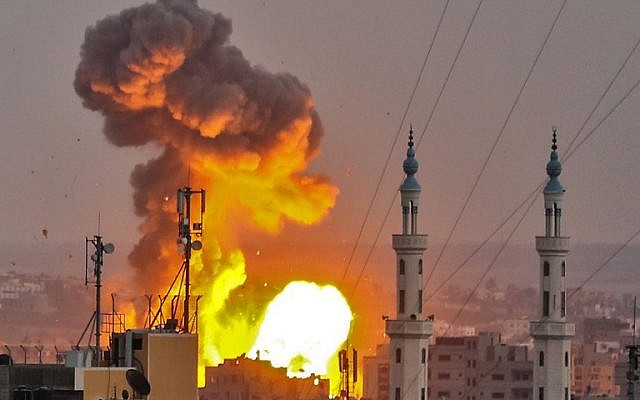Spoiler Alert: Contrary to what everyone thinks, Israel has a strategy regarding Gaza, at least for the short and medium term

In economics, one way to know what the priorities of an economic player are is through what is called “revealed preference.” Simply look at what they do and you then know their order of priorities. Revealed preference can easily be applied in the case of Israel’s strategy in Gaza. So what are the components of Israel’s short and medium strategy in Gaza, a strategy popularly known as “quiet in return for quiet,” and one that reflect Israel’s interest in avoiding escalation and readiness to live with the status quo?
- For lack of any other feasible alternative, Israel is ready to accept Hamas as the de-facto ruling party in the Gaza Strip. It is not easy to legitimize this de facto reality, since Hamas is a terror entity committed to Israel’s annihilation, but Israel believes that Hamas and the terrorism that comes with it can be constrained and contained for long periods of time.
- To restrain and contain the terror from Gaza, Israel uses a combination of tools that are supposed to keep Hamas powerful enough to force its will over violent elements in the Gaza Strip and at the same time weak and deterred from attacking Israel. Keeping this fragile equilibrium for a long time is tricky and from time to time, Israel has to exercise more tools to deal with deviations from this delicate balance. The toolkit includes a wide variety of military capabilities and operations, the security blockade, occasional economic pressure, and cooperation with Egypt and other Arab and international players.
- Israel is interested in improving the wellbeing of the Gazan population and for that purpose it is willing to encourage and facilitate foreign and Arab investments in the Gaza economy, on top of facilitating humanitarian aid for the residents of Gaza. In spite of the difficult context, Israel is constantly contemplating methods to help Gazans in order to improve their quality of life. Israel is also in favor of improving the ability of Gazans to enter and leave the Strip as long as this does not endanger its security, and is even ready to consider symbolic steps like letting commodities into Gaza not through Israel, namely from other seaports instead of Ashdod.
- It is critical for Israel to have its policy on Gaza coordinated and supported by Egypt, since Cairo shares with Israel the control over the Gaza borders and has a considerable impact on Israel’s ability to achieve the first two aforementioned goals. For Egypt, the major concern is the potential of radical Islamic groups in Gaza, including Hamas, to strengthen radical forces in Egypt itself, especially in the Sinai. So basically, there is a lot of overlap between the strategies of Egypt and Israel, though Egypt is determined to avoid assuming greater responsibility for Gaza as Israel wishes.
- Israel sees more advantages than disadvantages in the lasting separation between Gaza and the Palestinian Authority in the West Bank. The government is definitely opposed to the idea that Israel should bring Fatah back to Gaza. That being said, Israel would not take steps to place obstacles in front of a potential Palestinian reconciliation. It simply believes reconciliation is not going to happen because Hamas and Fatah will refuse to concede real power to the other in their respective areas of control.
- Israel is determined to minimize collateral damage to civilians in the Gaza Strip, both because it contradicts its values, interests and commitments to international law, and because a major component of Israel’s overall strategy is to avoid damage to its own legitimacy and image.
- Israel wants to make sure that the conflict in Gaza, which is considered as a second level risk, will not hamper its ability to focus on the first-tier challenges such as Iran or the Northern front.
- As long as Hamas patrons like Turkey, Qatar and Iran are busy contending with much greater problems, Hamas does not have the leverage to change its situation without conceding something Israel wants. Hamas terror should never pay off. On the contrary, Hamas has to pay a price for any use of terror.
What are the problems with this strategy?



I emailed the author asking why “Israel is interested in improving the wellbeing of the Gazan population”. If I get a reply, I will post it.
Why does Israel concern itself with the well being of the Gaza population that elected Hamas?
What has Hamas conceded?